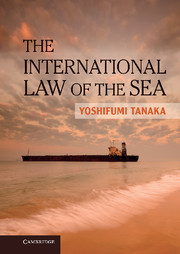Book contents
- Frontmatter
- Contents
- Preface
- Acknowledgements
- Figures
- Tables
- Abbreviations
- Table of Cases
- Table of Treaties and Instruments
- Part I The Divided Oceans: International Law Governing Jurisdictional Zones
- Part II Our Common Ocean: Protection of Community Interests at Sea
- 7 Conservation of Marine Living Resources
- 8 Protection of the Marine Environment
- 9 Conservation of Marine Biological Diversity
- 10 Marine Scientific Research
- 11 Maintenance of International Peace and Security at Sea
- 12 Land-Locked and Geographically Disadvantaged States
- 13 Peaceful Settlement of International Disputes
- Index
- References
8 - Protection of the Marine Environment
Main Issues
from Part II - Our Common Ocean: Protection of Community Interests at Sea
- Frontmatter
- Contents
- Preface
- Acknowledgements
- Figures
- Tables
- Abbreviations
- Table of Cases
- Table of Treaties and Instruments
- Part I The Divided Oceans: International Law Governing Jurisdictional Zones
- Part II Our Common Ocean: Protection of Community Interests at Sea
- 7 Conservation of Marine Living Resources
- 8 Protection of the Marine Environment
- 9 Conservation of Marine Biological Diversity
- 10 Marine Scientific Research
- 11 Maintenance of International Peace and Security at Sea
- 12 Land-Locked and Geographically Disadvantaged States
- 13 Peaceful Settlement of International Disputes
- Index
- References
Summary
Given that a healthy marine environment provides a foundation for all life, marine environmental protection is an issue of considerable importance in the law of the sea. In principle, the law regulates marine pollution according to its sources, such as land-based pollution, vessel-source pollution, dumping, pollution from seabed activities under national jurisdiction, pollution from activities in the Area, and pollution through the atmosphere. Accordingly, this chapter will seek to examine the rules of international law regulating marine pollution arising from these sources. Particular focus will be on the following issues:
What is the significance of the LOSC in marine environmental protection?
Why do rules regulating land-based marine pollution remain weak at the global level?
What are the new elements to regional treaties in the regulation of land-based pollution?
What are the mechanisms for regulating vessel-source marine pollution?
How is it possible to ensure compliance with relevant rules governing marine environmental protection?
Introduction
Currently marine pollution is an increasing threat to a healthy marine environment. Indeed, marine pollution may severely damage the environment, including ecosystems, and human health. It is common knowledge that mercury emissions from a factory at Minamata in Japan had poisoned fish and caused serious disease endangering the lives of coastal communities. It would be no exaggeration to say that the welfare of coastal populations relies essentially on a sound marine environment. Thus there appears to be a general sense that the protection of the marine environment is considered as a common interest of the international community as a whole.
- Type
- Chapter
- Information
- The International Law of the Sea , pp. 253 - 311Publisher: Cambridge University PressPrint publication year: 2012



